Analysis of Kohlberg's Stages of Moral Development: A Psychology Essay
VerifiedAdded on 2022/10/12
|7
|1542
|66
Essay
AI Summary
This essay delves into Lawrence Kohlberg's theory of moral development, a framework for understanding how individuals develop their sense of right and wrong. The essay begins with an introduction to Kohlberg's work, building upon Piaget's earlier theories. It outlines the six stages of moral development, categorized into three levels: pre-conventional, conventional, and post-conventional morality. Each stage is thoroughly described, providing examples and explanations of the reasoning processes involved. The essay includes a literature review of relevant research and concepts. The author then reflects on their current stage of moral reasoning. The essay concludes by emphasizing the significance of moral development in social interactions and decision-making, highlighting the value of Kohlberg's theory in understanding ethical reasoning. References to supporting literature are included.
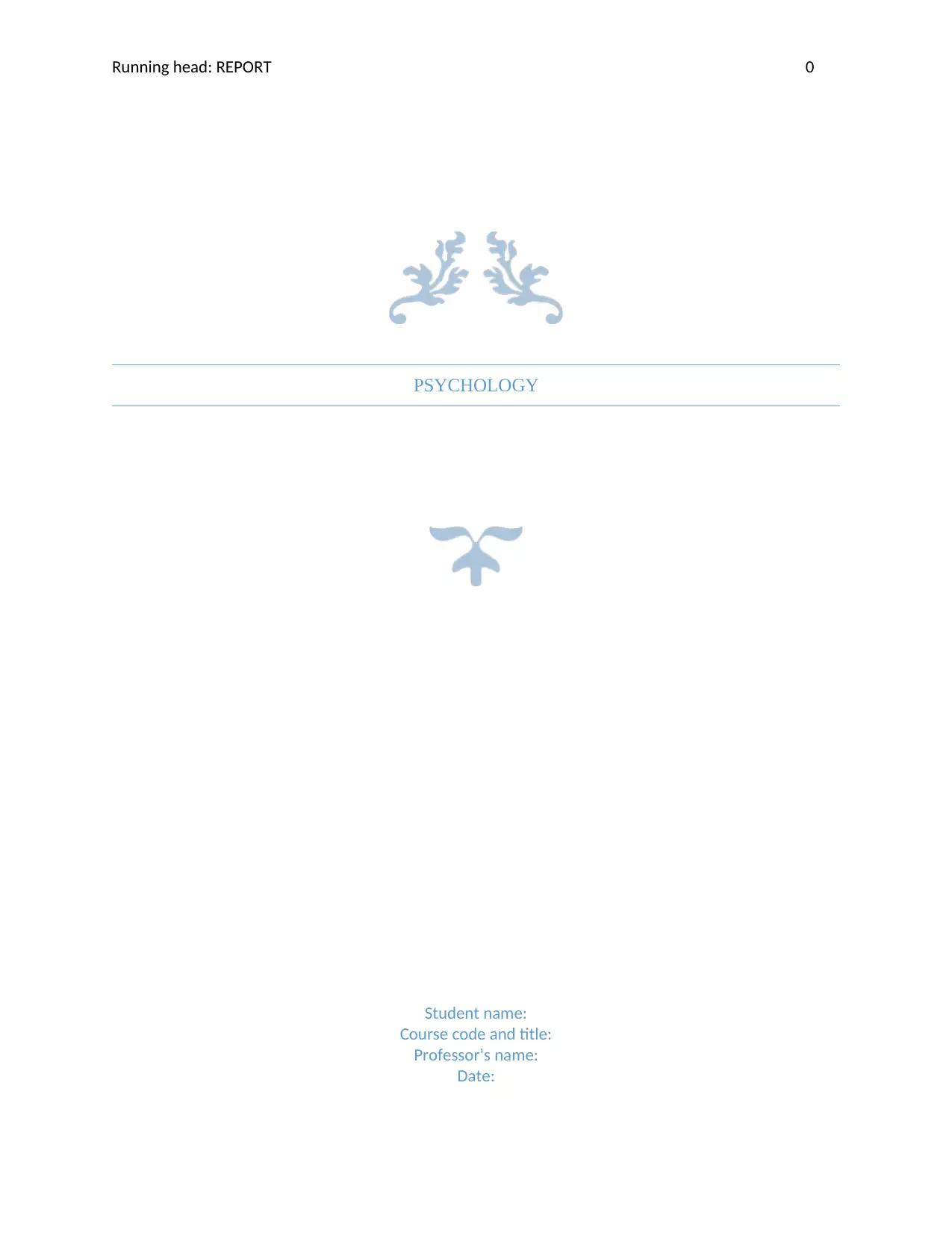
Running head: REPORT 0
PSYCHOLOGY
Student name:
Course code and title:
Professor’s name:
Date:
PSYCHOLOGY
Student name:
Course code and title:
Professor’s name:
Date:
Paraphrase This Document
Need a fresh take? Get an instant paraphrase of this document with our AI Paraphraser
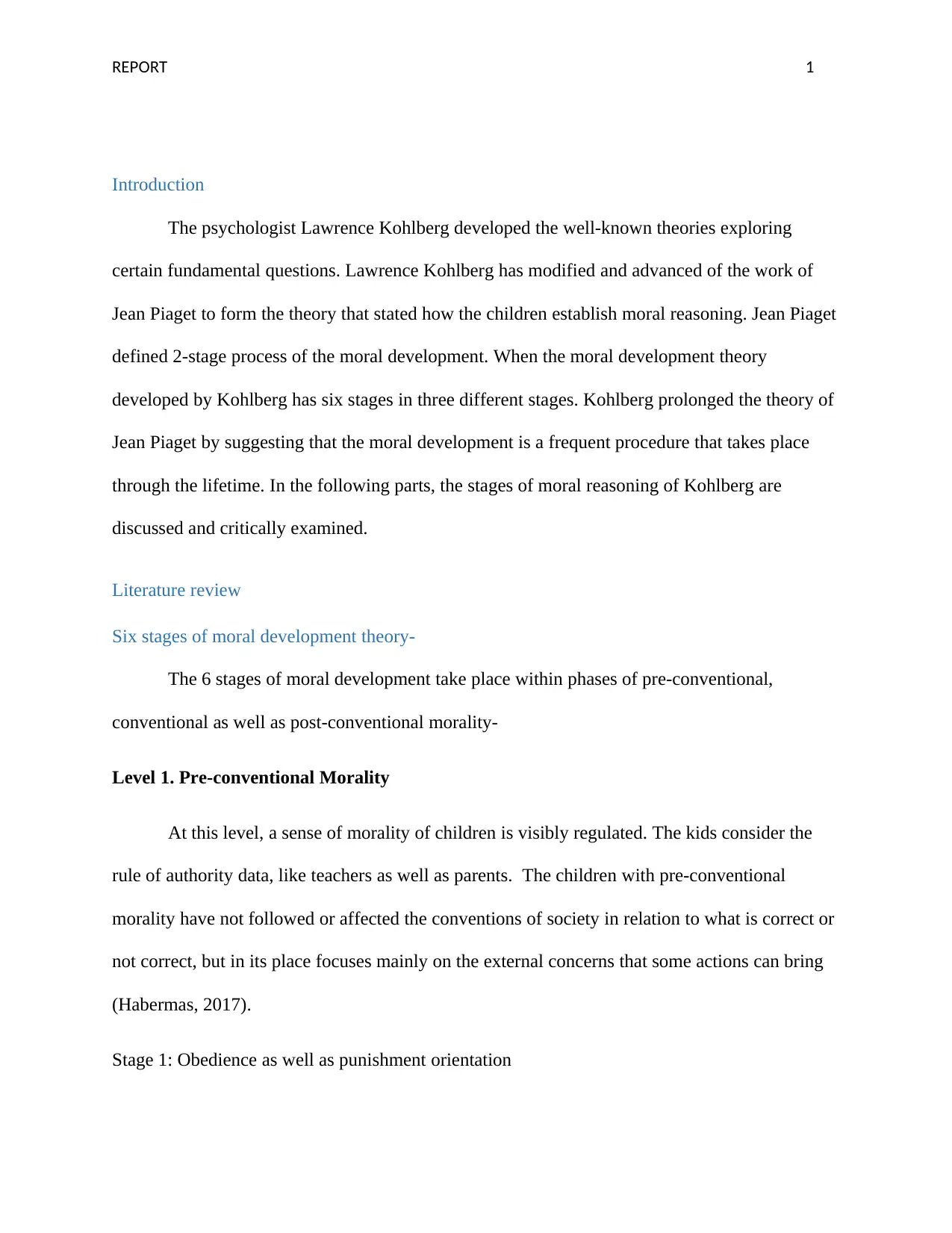
REPORT 1
Introduction
The psychologist Lawrence Kohlberg developed the well-known theories exploring
certain fundamental questions. Lawrence Kohlberg has modified and advanced of the work of
Jean Piaget to form the theory that stated how the children establish moral reasoning. Jean Piaget
defined 2-stage process of the moral development. When the moral development theory
developed by Kohlberg has six stages in three different stages. Kohlberg prolonged the theory of
Jean Piaget by suggesting that the moral development is a frequent procedure that takes place
through the lifetime. In the following parts, the stages of moral reasoning of Kohlberg are
discussed and critically examined.
Literature review
Six stages of moral development theory-
The 6 stages of moral development take place within phases of pre-conventional,
conventional as well as post-conventional morality-
Level 1. Pre-conventional Morality
At this level, a sense of morality of children is visibly regulated. The kids consider the
rule of authority data, like teachers as well as parents. The children with pre-conventional
morality have not followed or affected the conventions of society in relation to what is correct or
not correct, but in its place focuses mainly on the external concerns that some actions can bring
(Habermas, 2017).
Stage 1: Obedience as well as punishment orientation
Introduction
The psychologist Lawrence Kohlberg developed the well-known theories exploring
certain fundamental questions. Lawrence Kohlberg has modified and advanced of the work of
Jean Piaget to form the theory that stated how the children establish moral reasoning. Jean Piaget
defined 2-stage process of the moral development. When the moral development theory
developed by Kohlberg has six stages in three different stages. Kohlberg prolonged the theory of
Jean Piaget by suggesting that the moral development is a frequent procedure that takes place
through the lifetime. In the following parts, the stages of moral reasoning of Kohlberg are
discussed and critically examined.
Literature review
Six stages of moral development theory-
The 6 stages of moral development take place within phases of pre-conventional,
conventional as well as post-conventional morality-
Level 1. Pre-conventional Morality
At this level, a sense of morality of children is visibly regulated. The kids consider the
rule of authority data, like teachers as well as parents. The children with pre-conventional
morality have not followed or affected the conventions of society in relation to what is correct or
not correct, but in its place focuses mainly on the external concerns that some actions can bring
(Habermas, 2017).
Stage 1: Obedience as well as punishment orientation
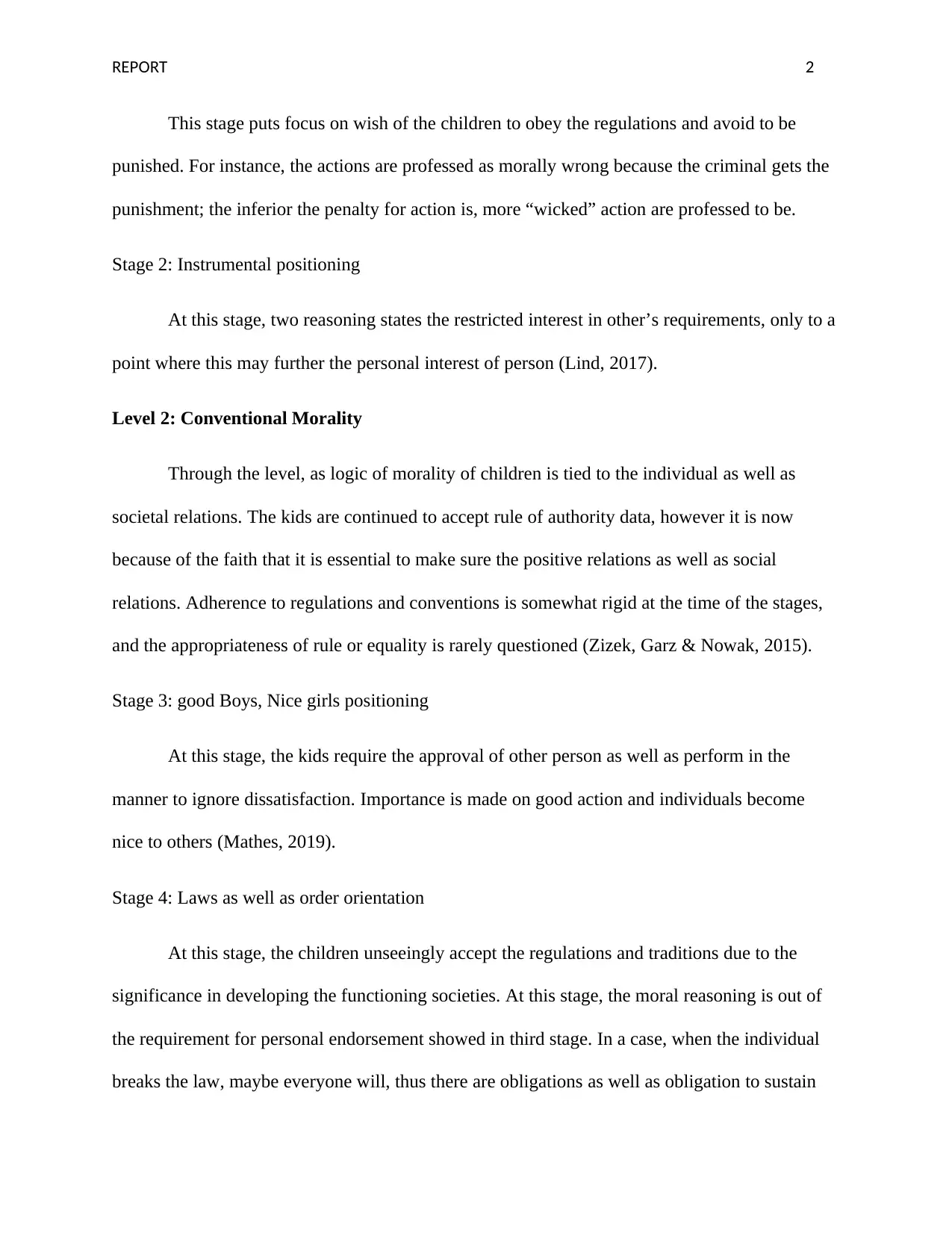
REPORT 2
This stage puts focus on wish of the children to obey the regulations and avoid to be
punished. For instance, the actions are professed as morally wrong because the criminal gets the
punishment; the inferior the penalty for action is, more “wicked” action are professed to be.
Stage 2: Instrumental positioning
At this stage, two reasoning states the restricted interest in other’s requirements, only to a
point where this may further the personal interest of person (Lind, 2017).
Level 2: Conventional Morality
Through the level, as logic of morality of children is tied to the individual as well as
societal relations. The kids are continued to accept rule of authority data, however it is now
because of the faith that it is essential to make sure the positive relations as well as social
relations. Adherence to regulations and conventions is somewhat rigid at the time of the stages,
and the appropriateness of rule or equality is rarely questioned (Zizek, Garz & Nowak, 2015).
Stage 3: good Boys, Nice girls positioning
At this stage, the kids require the approval of other person as well as perform in the
manner to ignore dissatisfaction. Importance is made on good action and individuals become
nice to others (Mathes, 2019).
Stage 4: Laws as well as order orientation
At this stage, the children unseeingly accept the regulations and traditions due to the
significance in developing the functioning societies. At this stage, the moral reasoning is out of
the requirement for personal endorsement showed in third stage. In a case, when the individual
breaks the law, maybe everyone will, thus there are obligations as well as obligation to sustain
This stage puts focus on wish of the children to obey the regulations and avoid to be
punished. For instance, the actions are professed as morally wrong because the criminal gets the
punishment; the inferior the penalty for action is, more “wicked” action are professed to be.
Stage 2: Instrumental positioning
At this stage, two reasoning states the restricted interest in other’s requirements, only to a
point where this may further the personal interest of person (Lind, 2017).
Level 2: Conventional Morality
Through the level, as logic of morality of children is tied to the individual as well as
societal relations. The kids are continued to accept rule of authority data, however it is now
because of the faith that it is essential to make sure the positive relations as well as social
relations. Adherence to regulations and conventions is somewhat rigid at the time of the stages,
and the appropriateness of rule or equality is rarely questioned (Zizek, Garz & Nowak, 2015).
Stage 3: good Boys, Nice girls positioning
At this stage, the kids require the approval of other person as well as perform in the
manner to ignore dissatisfaction. Importance is made on good action and individuals become
nice to others (Mathes, 2019).
Stage 4: Laws as well as order orientation
At this stage, the children unseeingly accept the regulations and traditions due to the
significance in developing the functioning societies. At this stage, the moral reasoning is out of
the requirement for personal endorsement showed in third stage. In a case, when the individual
breaks the law, maybe everyone will, thus there are obligations as well as obligation to sustain
⊘ This is a preview!⊘
Do you want full access?
Subscribe today to unlock all pages.

Trusted by 1+ million students worldwide
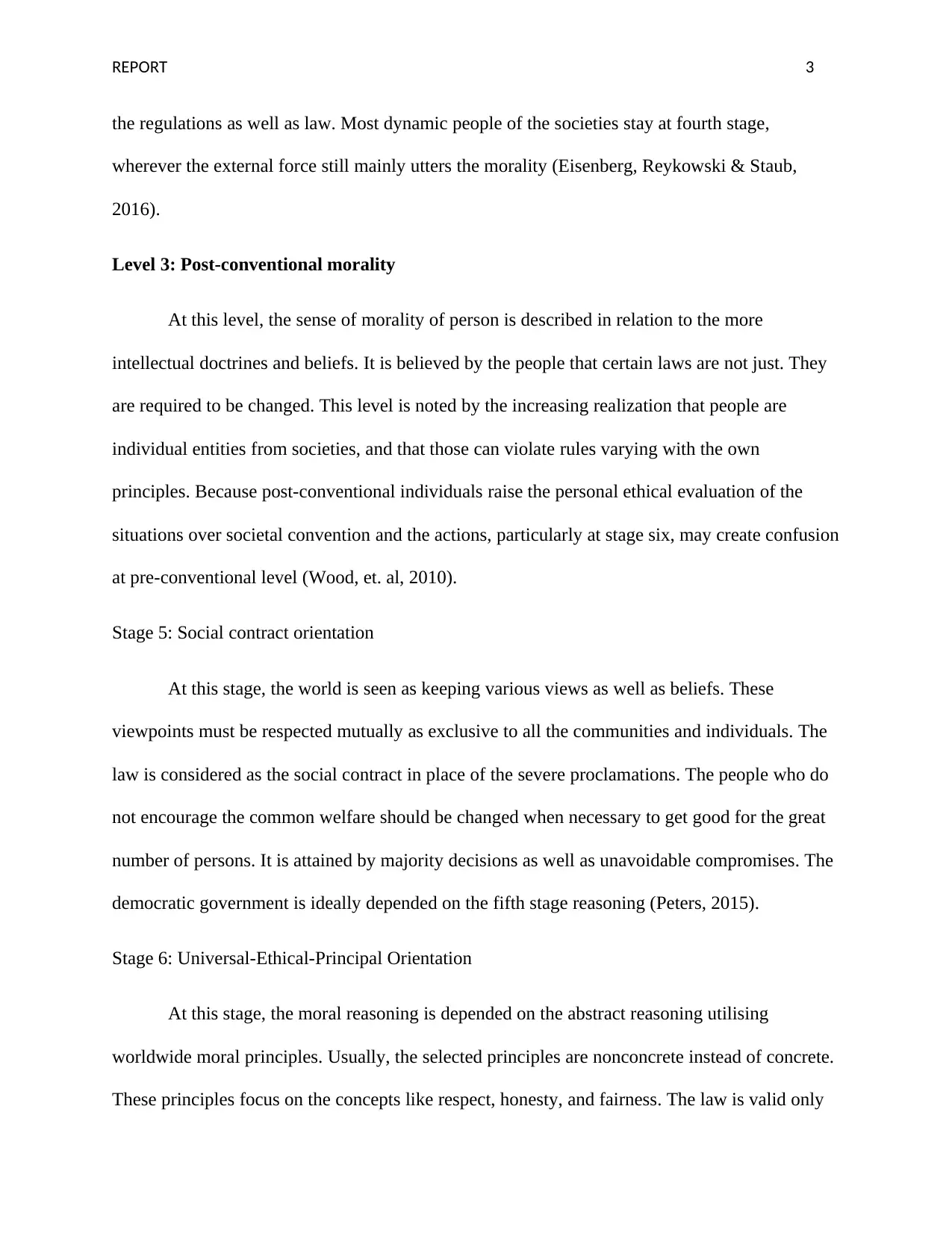
REPORT 3
the regulations as well as law. Most dynamic people of the societies stay at fourth stage,
wherever the external force still mainly utters the morality (Eisenberg, Reykowski & Staub,
2016).
Level 3: Post-conventional morality
At this level, the sense of morality of person is described in relation to the more
intellectual doctrines and beliefs. It is believed by the people that certain laws are not just. They
are required to be changed. This level is noted by the increasing realization that people are
individual entities from societies, and that those can violate rules varying with the own
principles. Because post-conventional individuals raise the personal ethical evaluation of the
situations over societal convention and the actions, particularly at stage six, may create confusion
at pre-conventional level (Wood, et. al, 2010).
Stage 5: Social contract orientation
At this stage, the world is seen as keeping various views as well as beliefs. These
viewpoints must be respected mutually as exclusive to all the communities and individuals. The
law is considered as the social contract in place of the severe proclamations. The people who do
not encourage the common welfare should be changed when necessary to get good for the great
number of persons. It is attained by majority decisions as well as unavoidable compromises. The
democratic government is ideally depended on the fifth stage reasoning (Peters, 2015).
Stage 6: Universal-Ethical-Principal Orientation
At this stage, the moral reasoning is depended on the abstract reasoning utilising
worldwide moral principles. Usually, the selected principles are nonconcrete instead of concrete.
These principles focus on the concepts like respect, honesty, and fairness. The law is valid only
the regulations as well as law. Most dynamic people of the societies stay at fourth stage,
wherever the external force still mainly utters the morality (Eisenberg, Reykowski & Staub,
2016).
Level 3: Post-conventional morality
At this level, the sense of morality of person is described in relation to the more
intellectual doctrines and beliefs. It is believed by the people that certain laws are not just. They
are required to be changed. This level is noted by the increasing realization that people are
individual entities from societies, and that those can violate rules varying with the own
principles. Because post-conventional individuals raise the personal ethical evaluation of the
situations over societal convention and the actions, particularly at stage six, may create confusion
at pre-conventional level (Wood, et. al, 2010).
Stage 5: Social contract orientation
At this stage, the world is seen as keeping various views as well as beliefs. These
viewpoints must be respected mutually as exclusive to all the communities and individuals. The
law is considered as the social contract in place of the severe proclamations. The people who do
not encourage the common welfare should be changed when necessary to get good for the great
number of persons. It is attained by majority decisions as well as unavoidable compromises. The
democratic government is ideally depended on the fifth stage reasoning (Peters, 2015).
Stage 6: Universal-Ethical-Principal Orientation
At this stage, the moral reasoning is depended on the abstract reasoning utilising
worldwide moral principles. Usually, the selected principles are nonconcrete instead of concrete.
These principles focus on the concepts like respect, honesty, and fairness. The law is valid only
Paraphrase This Document
Need a fresh take? Get an instant paraphrase of this document with our AI Paraphraser
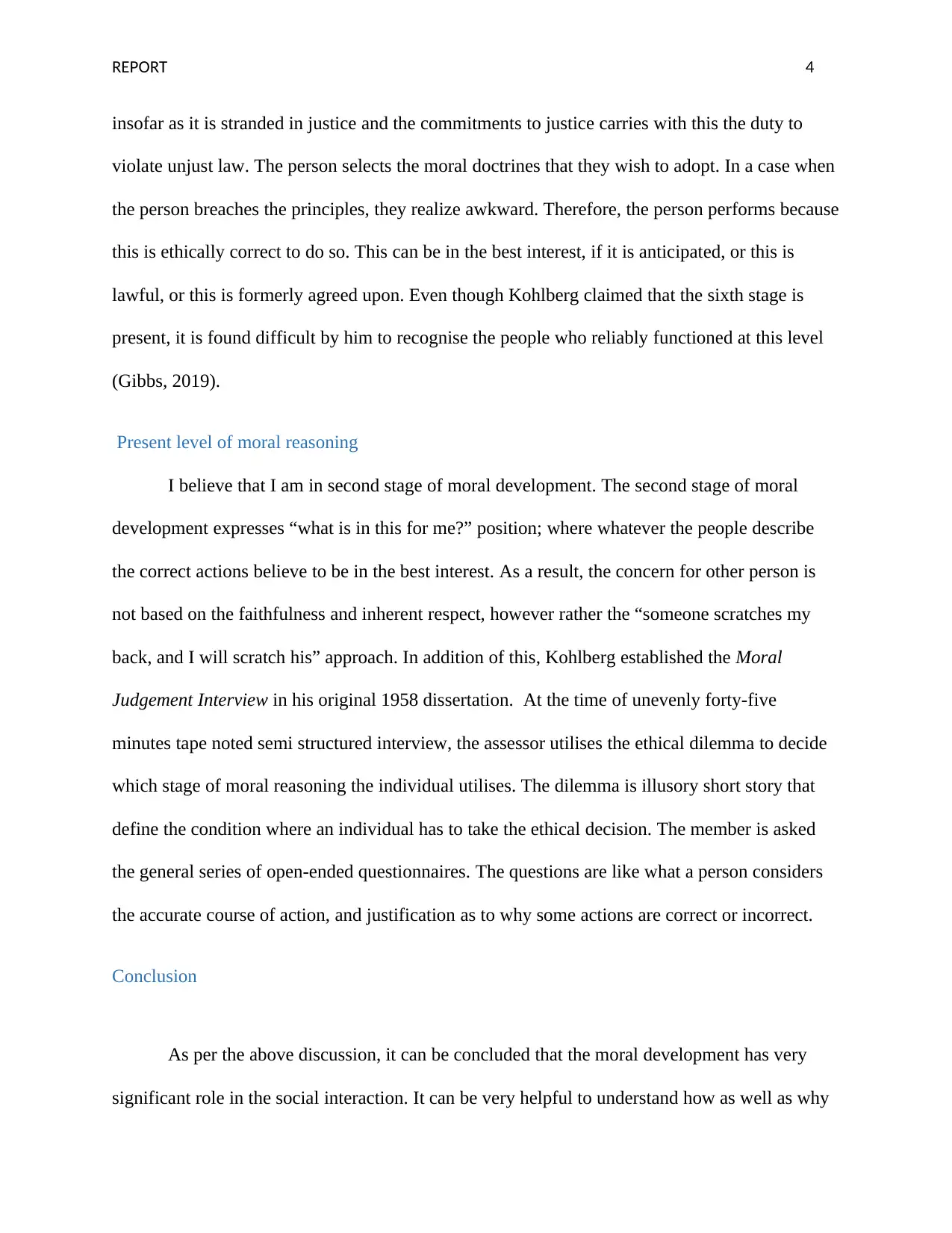
REPORT 4
insofar as it is stranded in justice and the commitments to justice carries with this the duty to
violate unjust law. The person selects the moral doctrines that they wish to adopt. In a case when
the person breaches the principles, they realize awkward. Therefore, the person performs because
this is ethically correct to do so. This can be in the best interest, if it is anticipated, or this is
lawful, or this is formerly agreed upon. Even though Kohlberg claimed that the sixth stage is
present, it is found difficult by him to recognise the people who reliably functioned at this level
(Gibbs, 2019).
Present level of moral reasoning
I believe that I am in second stage of moral development. The second stage of moral
development expresses “what is in this for me?” position; where whatever the people describe
the correct actions believe to be in the best interest. As a result, the concern for other person is
not based on the faithfulness and inherent respect, however rather the “someone scratches my
back, and I will scratch his” approach. In addition of this, Kohlberg established the Moral
Judgement Interview in his original 1958 dissertation. At the time of unevenly forty-five
minutes tape noted semi structured interview, the assessor utilises the ethical dilemma to decide
which stage of moral reasoning the individual utilises. The dilemma is illusory short story that
define the condition where an individual has to take the ethical decision. The member is asked
the general series of open-ended questionnaires. The questions are like what a person considers
the accurate course of action, and justification as to why some actions are correct or incorrect.
Conclusion
As per the above discussion, it can be concluded that the moral development has very
significant role in the social interaction. It can be very helpful to understand how as well as why
insofar as it is stranded in justice and the commitments to justice carries with this the duty to
violate unjust law. The person selects the moral doctrines that they wish to adopt. In a case when
the person breaches the principles, they realize awkward. Therefore, the person performs because
this is ethically correct to do so. This can be in the best interest, if it is anticipated, or this is
lawful, or this is formerly agreed upon. Even though Kohlberg claimed that the sixth stage is
present, it is found difficult by him to recognise the people who reliably functioned at this level
(Gibbs, 2019).
Present level of moral reasoning
I believe that I am in second stage of moral development. The second stage of moral
development expresses “what is in this for me?” position; where whatever the people describe
the correct actions believe to be in the best interest. As a result, the concern for other person is
not based on the faithfulness and inherent respect, however rather the “someone scratches my
back, and I will scratch his” approach. In addition of this, Kohlberg established the Moral
Judgement Interview in his original 1958 dissertation. At the time of unevenly forty-five
minutes tape noted semi structured interview, the assessor utilises the ethical dilemma to decide
which stage of moral reasoning the individual utilises. The dilemma is illusory short story that
define the condition where an individual has to take the ethical decision. The member is asked
the general series of open-ended questionnaires. The questions are like what a person considers
the accurate course of action, and justification as to why some actions are correct or incorrect.
Conclusion
As per the above discussion, it can be concluded that the moral development has very
significant role in the social interaction. It can be very helpful to understand how as well as why
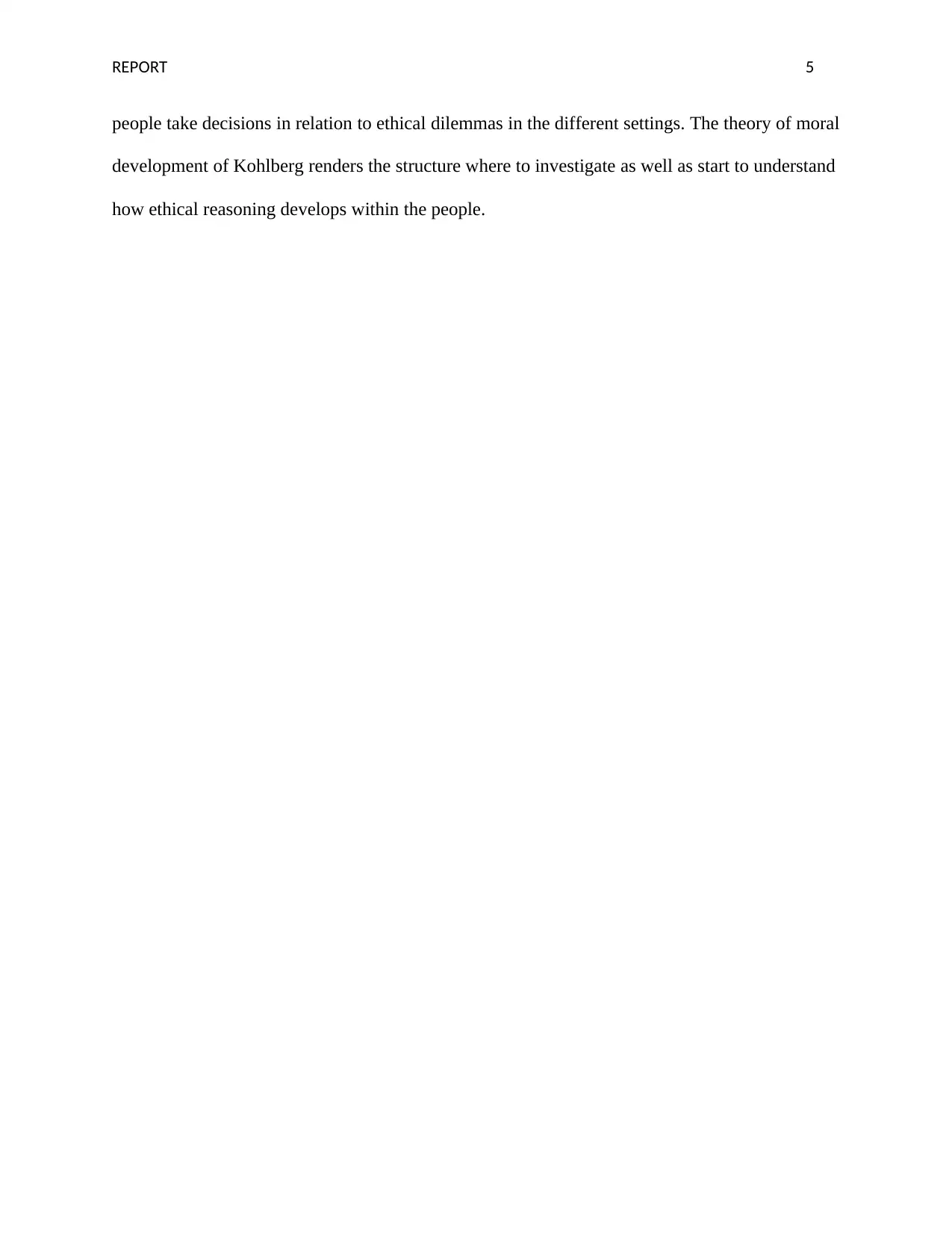
REPORT 5
people take decisions in relation to ethical dilemmas in the different settings. The theory of moral
development of Kohlberg renders the structure where to investigate as well as start to understand
how ethical reasoning develops within the people.
people take decisions in relation to ethical dilemmas in the different settings. The theory of moral
development of Kohlberg renders the structure where to investigate as well as start to understand
how ethical reasoning develops within the people.
⊘ This is a preview!⊘
Do you want full access?
Subscribe today to unlock all pages.

Trusted by 1+ million students worldwide
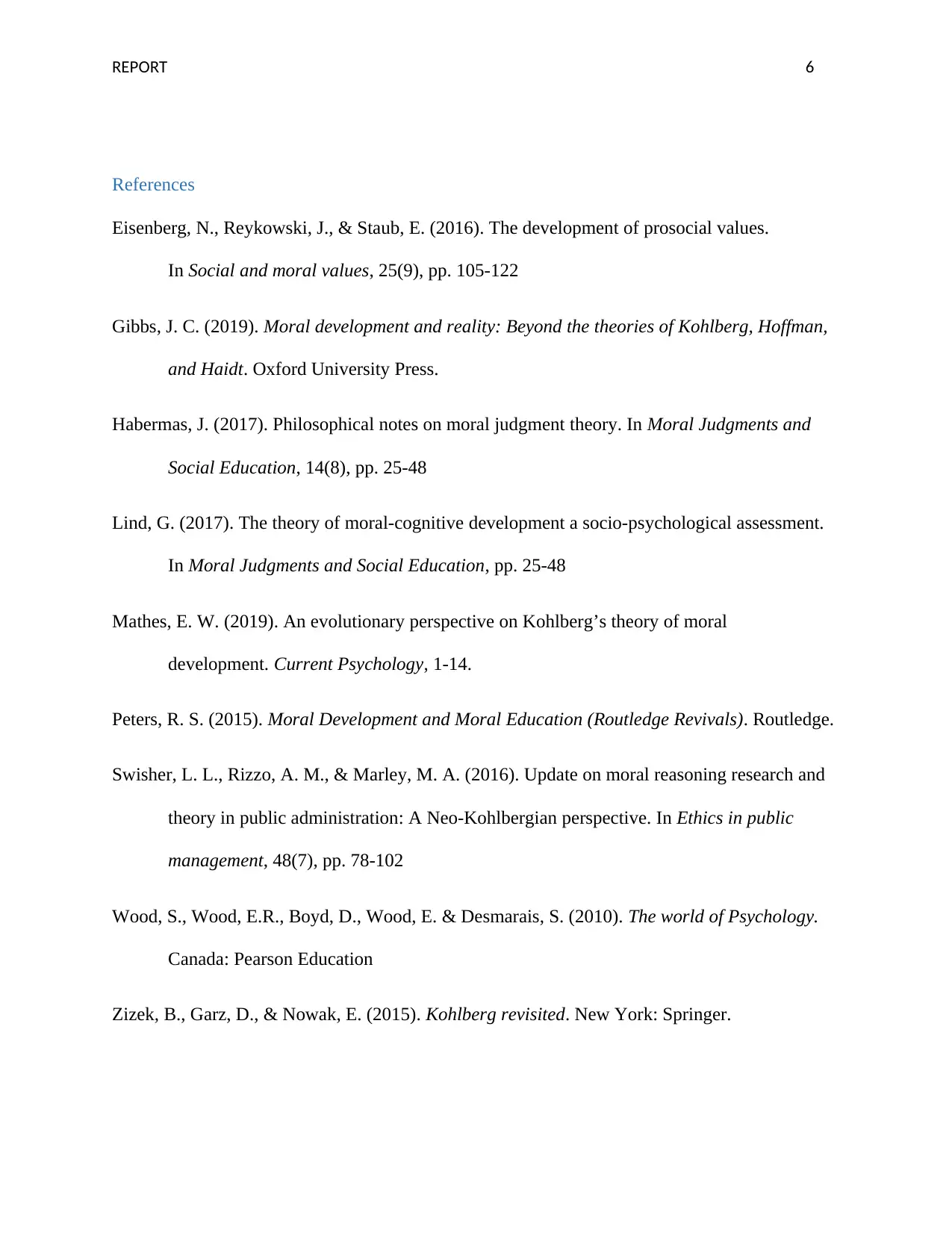
REPORT 6
References
Eisenberg, N., Reykowski, J., & Staub, E. (2016). The development of prosocial values.
In Social and moral values, 25(9), pp. 105-122
Gibbs, J. C. (2019). Moral development and reality: Beyond the theories of Kohlberg, Hoffman,
and Haidt. Oxford University Press.
Habermas, J. (2017). Philosophical notes on moral judgment theory. In Moral Judgments and
Social Education, 14(8), pp. 25-48
Lind, G. (2017). The theory of moral-cognitive development a socio-psychological assessment.
In Moral Judgments and Social Education, pp. 25-48
Mathes, E. W. (2019). An evolutionary perspective on Kohlberg’s theory of moral
development. Current Psychology, 1-14.
Peters, R. S. (2015). Moral Development and Moral Education (Routledge Revivals). Routledge.
Swisher, L. L., Rizzo, A. M., & Marley, M. A. (2016). Update on moral reasoning research and
theory in public administration: A Neo-Kohlbergian perspective. In Ethics in public
management, 48(7), pp. 78-102
Wood, S., Wood, E.R., Boyd, D., Wood, E. & Desmarais, S. (2010). The world of Psychology.
Canada: Pearson Education
Zizek, B., Garz, D., & Nowak, E. (2015). Kohlberg revisited. New York: Springer.
References
Eisenberg, N., Reykowski, J., & Staub, E. (2016). The development of prosocial values.
In Social and moral values, 25(9), pp. 105-122
Gibbs, J. C. (2019). Moral development and reality: Beyond the theories of Kohlberg, Hoffman,
and Haidt. Oxford University Press.
Habermas, J. (2017). Philosophical notes on moral judgment theory. In Moral Judgments and
Social Education, 14(8), pp. 25-48
Lind, G. (2017). The theory of moral-cognitive development a socio-psychological assessment.
In Moral Judgments and Social Education, pp. 25-48
Mathes, E. W. (2019). An evolutionary perspective on Kohlberg’s theory of moral
development. Current Psychology, 1-14.
Peters, R. S. (2015). Moral Development and Moral Education (Routledge Revivals). Routledge.
Swisher, L. L., Rizzo, A. M., & Marley, M. A. (2016). Update on moral reasoning research and
theory in public administration: A Neo-Kohlbergian perspective. In Ethics in public
management, 48(7), pp. 78-102
Wood, S., Wood, E.R., Boyd, D., Wood, E. & Desmarais, S. (2010). The world of Psychology.
Canada: Pearson Education
Zizek, B., Garz, D., & Nowak, E. (2015). Kohlberg revisited. New York: Springer.
1 out of 7
Related Documents
Your All-in-One AI-Powered Toolkit for Academic Success.
+13062052269
info@desklib.com
Available 24*7 on WhatsApp / Email
![[object Object]](/_next/static/media/star-bottom.7253800d.svg)
Unlock your academic potential
Copyright © 2020–2026 A2Z Services. All Rights Reserved. Developed and managed by ZUCOL.





